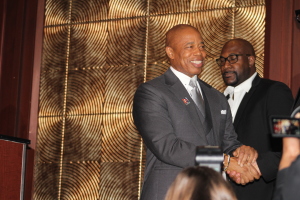Our Government and Your Checking Account
Introduction
Your checkbook can be a fantastic money management tool IF you learn to use it correctly. If you choose not to manage your checkbook you can expect difficulties. But difficulties can come from other sources as well. You need to understand what "Check 21" is, how it affects you, your finances, and your record-keeping. Remember, good record-keeping is part of good financial stewardship and good stewardship is God-pleasing.
How does Check 21 affect you?
Because of Check 21 and other check-system improvements, your checking account checks may be processed faster - which means money may be deducted from your checking account faster. Before you write a check, make sure that your checking account has enough money in it to cover the check.
You may be one of the majority of consumers who do not receive their canceled checks with their account statements. Instead, you may receive "pictures" (known as digital images) of your checks, a list of your paid checks, or a combination of these items. Check 21 will have little or no effect on these practices.
On the other hand, if you do get your canceled checks back in your regular account statements, you may notice some changes under Check 21. For example, your bank may start sending you a combination of original checks and substitute checks in your account statements. You may use a canceled substitute check as proof of payment just as you would use a canceled original check.
The account agreement you have with your bank governs whether you receive canceled checks with your account statements. If you currently get canceled checks back with your statements, you will continue to receive your checks unless your bank notifies you that it is changing your account agreement.
You may receive substitute checks in other limited circumstances. For example, your bank may give you a substitute check if you ask to have a particular canceled check back to prove a payment. Also, your bank might provide a substitute check to you when returning a "bounced" check that you deposited into your account.
By law, your bank may not pay a check from your account unless you authorized that payment. In other words, you are protected from having your bank pay the same check from your account more than once or from having your bank pay the wrong amount for a check. Check 21 does not change these protections. However, Check 21 does give you special rights if you receive a substitute check from your bank. This guide explains your rights regarding substitute checks. For your rights in other situations, contact your bank.
What is a substitute check?
A substitute check is a special paper copy of the front and back of an original check. The substitute check may be slightly larger than the original check. Substitute checks are specially formatted so they can be processed as if they were original checks. The front of a substitute check should state: "This is a legal copy of your check. You can use it the same way you would use the original check." The following sample shows what a substitute check looks like.
Not all copies of a check are substitute checks. For example, pictures of multiple checks printed on a page (also known as an image statement) that is returned to you with your monthly statement are not substitute checks. Online check images and photocopies of original checks are not substitute checks either. You can use image statements and other copies of checks to verify that your bank has paid a check.
Can I require my bank to return my original check?
No. In general, the law does not require your bank to return your original check. Many banks destroy original paper checks. Other banks may store original checks for some period of time and then destroy them. Check 21 ensures that you have the same legal protections when you receive a substitute check from your bank as you do when you receive an original check.
What should I do if I receive a substitute check and there is a problem?
Check 21 provides a special process that allows you to claim a refund (also known as an expedited re-credit) when you receive a substitute check from a bank and you think there is an error because of the substitute check. For example, you may think that you were charged twice for the same check.
You may use the special process to get a refund of the money you lost. The amount of your refund under the special process is limited to the amount of your loss or the amount of the substitute check that you received, whichever is less, plus interest on that amount if your account earns interest. If your loss is more than the amount of the substitute check, you may have the right under other laws to recover additional amounts of money.
If your bank finds that your claim is valid, you should receive your refund by the next business day after the bank's finding. Unless your bank finds that your claim is not valid, you should receive up to $2,500 of your refund (plus interest if your account earns interest) within 10 business days after your bank receives your claim. You should receive the rest of your refund (plus interest if your account earns interest) no later than 45 days after your bank receives your claim. If your bank finds that your claim is not valid, it will send you a notice explaining why.
Your bank may reverse the refund (including any interest on the refund) if it can show that the substitute check did not cause an error in your account.
How do I file a claim under the special refund procedure for substitute checks?
If you notice a problem with a substitute check, you should contact your bank as soon as possible. In general, to use the special refund procedure for substitute checks, you should contact your bank no later than 40 days from the date your bank provided the substitute check or from the date of the statement that shows the problem.
In general, you must
• Describe why you think the charge to your account is incorrect.
• Describe why you believe the original check or a better version of the substitute check is needed to determine whether the substitute check should have been deducted from your account.
• Estimate how much money you lost because of the substitute check. (Include any fees you were charged as a result of the substitute check. Also, alert your bank to any interest you lost, if your account earns interest.)
• Provide a copy of the substitute check, or give your bank information that will help it identify the substitute check and investigate your claim.
What if I have more questions about substitute checks?
• Contact your bank.
• Visit the online information on Check 21.
• Contact your state's consumer protection agency or attorney general's office for information on state laws that apply to checks and substitute checks.
Remember . . .
• When a bank uses substitute checks, your checks may be processed faster. Be sure you have enough money in your account to cover the checks that you write.
• Always review your account statement to make sure the charges are correct.
• If you receive something other than a substitute check, be aware of your rights to resolve errors under other state and federal laws.
• Contact your bank right away if you notice an error in your account.
_______________________________________________
Bob Louder is the Founder and President of Christian Financial Ministries (www.good-steward.org). Bob is also the author of the new best selling book, "Debt Free Living God's Way," available only on the Internet (www.debtfreelivinggodsway.org). Since 1987 Bob has helped people in hundreds of churches all across the country and in the European military community learn, understand, apply and pass on "Debt Free Living God's Way" principles and practical applications. He has represented some of the top Christian financial authors and ministries to include Larry Burkett, Dave Ramsey, Christian Financial Concepts, and Crown Ministries.
Copyright 2006 Christian Financial Ministries, Inc., All Rights Reserved. You may reprint this "Special Report" in whole or in part without permission from Christian Financial Ministries, Inc. Please credit material used to Christian Financial Ministries, Inc.





























